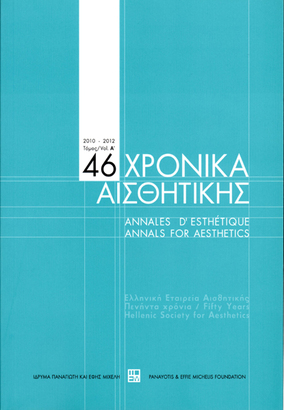Οι μεταμορφώσεις του Διονύσου : μια μικρή γενεαλογία της μοντέρνας τέχνης
Part of : Χρονικά αισθητικής : ετήσιον δελτίον της Ελληνικής Εταιρείας Αισθητικής ; Vol.46, No.Α, 2010, pages 343-355
Issue:
Pages:
343-355
Parallel Title:
The metamorphoses of Dionysus : a brief genealogy of modern art
Section Title:
Αισθητική - Φιλοσοφία της Τέχνης - Ιστορία της Τέχνης Aesthetics/Philosophy of Art - History of Art
Author:
Abstract:
According to Nietzsche, Dionysus, the god of transformations and deception, is the generative and critical source of all our actions, feelings and thoughts. Departing from Dionysus, Nietzsche rejects the metaphysical quest for a true, absolute in space and time, being, in favour of the tragic pursuit of the powers and the will which define the meaning and value of a thing which undergoes a constant transformation. Within this framework an inquiry engages us here into the genealogy of Western art.Things participate in the play of transformations and deception in two ways: as masks as well as powers hidden behind them. Masks and powers are in a constant change of position. Thus, Renaissance art borrows the Classical mask, similarly to the first Christians who had borrowed it from the Romans. The notion of eternal return, which stems from the Dionysian myth, defines for Nietzsche the synthesis between time and the multiform of things. Movements within the Modern, such as Cubism or Surrealism, indicate the notion of eternal return in this sense.Modern art, at the dawn of the twentieth century long before it appeared wearing its own mask, used the Classical mask due to its undisputable value. Based on the assumption that Renaissance constitutes the forerunner of the Modern, we can argue that, for five centuries, Modern art strove hidden behind constant repetitions and variations of the Classical mask, to renounce unity and the “good” forms, seeking for the joy of being in dismemberment and multiformity, which for Nietzsche constitutes the essence of the tragic. Hence, the Modern work of art acquires existence as a Dionysian becoming that - through deformation, fragmentation and constant transformations - always concerns the world as a whole. In this way, Modern avant guard transcends the limits of space and time and gains universality.
Subject:
Subject (LC):
Keywords:
μοντέρνα τέχνη, ελληνικές θεότητες
Notes:
Περιέχει εικόνες




